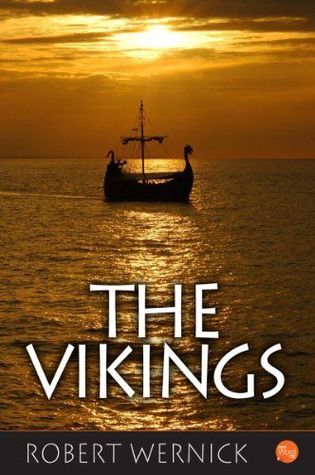 Robert Wernick’s The Vikings is an extremely informative though in no way exhaustive history of a people who are frequently depicted and often romanticized but perhaps seldom really understood. Wernick engagingly tells the story of the Vikings’ infamous bent towards pugilism both outsiders and with their own people, their truly inspiring seafaring prowess, their religious beliefs, their great love of wealth (specifically the wealth of others), their ingenuity in technology, the evolution of their laws and social customs, their exploration and expansion, and, ultimately, their demise as a people.
Robert Wernick’s The Vikings is an extremely informative though in no way exhaustive history of a people who are frequently depicted and often romanticized but perhaps seldom really understood. Wernick engagingly tells the story of the Vikings’ infamous bent towards pugilism both outsiders and with their own people, their truly inspiring seafaring prowess, their religious beliefs, their great love of wealth (specifically the wealth of others), their ingenuity in technology, the evolution of their laws and social customs, their exploration and expansion, and, ultimately, their demise as a people.
I was unaware of just how much of a scourge the Vikings had become to European society at large, just how many rulers and societies essentially folded like a house of cards before their ruthless and unrelenting onslaught, and just how frequently and often the Vikings returned to plunder and replunder the same areas. Wernick does not romanticize the Vikings. They are presented warts and all. Some of the tales of their brutality are stomach-churning to say the least. And, in Wernick’s telling, their quick-on-the-draw default to violence was one of their great shortcomings. Nonetheless, the courage of the Vikings and their strength and resilience as a people is indeed something worthy of awe.
Wernick recounts how only twice were the Vikings thwarted in their efforts at conquest: by Alfred the Great, King of Wessex, and by the Irish. Alfred the Great held off the Vikings by a cunning employment of diplomacy and military might. The Irish, on the other hand, were a perplexing conundrum for the Vikings and, though they made certain substantial inroads into Ireland, they finally and ultimately left the Irish without subduing them as a people.
I was intrigued also to read of the Vikings’ relationship with Christianity. Wreck recounts how the Vikings did not often convert with anything like true and sole devotion and fervor, though some did. More times than not, a Viking’s conversion to Christianity was undertaken because it was politically expedient or would advance their own needs…which, come to think of it, happens all too often today as well. More often this this, Christianity was embraced syncretistically by the Vikings and the God of Christianity was simply placed among the pantheons of their own gods.
Wernick effectively tells of the Viking expansion Westward to Greenland, Iceland, and, ultimately, to the North American continent. This last part of the book was probably my favorite. Viking exploration and settlement is an enthralling tale of courage, of ingenuity, of brilliance (and, occasionally, stupidity), and of the indomitability of the human spirit.
There are some fascinating tales told in this book and some truly memorable characters presented. The book is not overly long, but Wernick does a good job of giving a more than sufficient introductory overview of the Vikings. This is what a survey should be: detailed enough so that the reader knows the author has the force of authority and research behind his words but not so detailed that one wanting an overview will get lost or unduly distracted. The book maintains a good pace and just enough of the exciting or the surreal is included to keep the reader’s interest. In all, a solid work.
